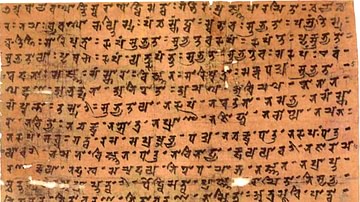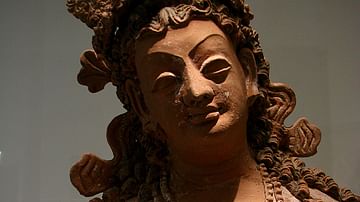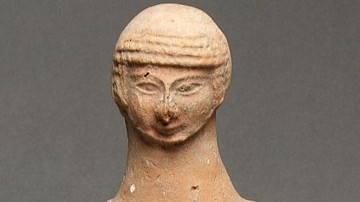Search Definitions
Browse Content (p. 111)

Definition
Giovanni Bellini
Giovanni Bellini (c. 1430-1516 CE) was an Italian Renaissance artist best known for his innovative use of colour, interest in light, and emphasis on brushwork. Today, Giovanni is recognised as the most innovative and influential of the Bellini...

Definition
Perfection of Wisdom
Perfection of Wisdom is the foundational text of the Mahayana Buddhist school, a kind of anthology of works, thematically linked, composed between c. 50 BCE - c. 600 CE in India by Mahayana Buddhist scribes. It is comprised of 38 sutras (defined...

Definition
Tintoretto
Tintoretto (c. 1518-1594 CE), real name Jacopo Robusti, was an Italian Renaissance artist who specialised in religious, mythological, and portrait paintings. A prolific artist over a long career, the Venetian's masterpieces are famous for...

Definition
Judean Pillar Figurines
Judean pillar figurines are an interesting and specific form of female representation from the Iron Age kingdom of Judah. They fall into a broader category of pillar figurines, which have a pole-like lower body and have been found throughout...

Definition
Mahasanghika
Mahasanghika (“Great Congregation”, also given as Mahasamghika) was an early Buddhist school of thought which is thought to have been formed after the Second Buddhist Council of 383 BCE when it separated itself from another school, the Sthaviravada...

Definition
Asherah
Asherah is a Hebrew word for what was either a goddess or a cultic object or perhaps both. Although many see evidence for Asherah being an individual goddess known to the Israelites, some scholars believe that the context of the word primarily...

Definition
Samhain
Samhain (pronounced “SOW-in” or “SAH-win”), was a festival celebrated by the ancient Celts halfway between the autumn equinox and the winter solstice. It began at dusk around October 31st and likely lasted three days. Samhain marked the transition...

Definition
Buddhism
Buddhism is a non-theistic religion (no belief in a creator god), also considered a philosophy and a moral discipline, originating in the region of modern-day India in the 6th and 5th centuries BCE. It was founded by the sage Siddhartha Gautama...

Definition
Benvenuto Cellini
Benvenuto Cellini (1500-1571 CE) was an Italian Renaissance sculptor, medallist, and goldsmith whose most famous works today include the bronze statue of Perseus holding the head of Medusa, which now stands in Florence, and a magnificent...

Definition
Siddhartha Gautama
Siddhartha Gautama (better known as the Buddha, l. c. 563 - c. 483 BCE) was, according to legend, a Hindu prince who renounced his position and wealth to seek enlightenment as a spiritual ascetic, attained his goal and, in preaching his path...